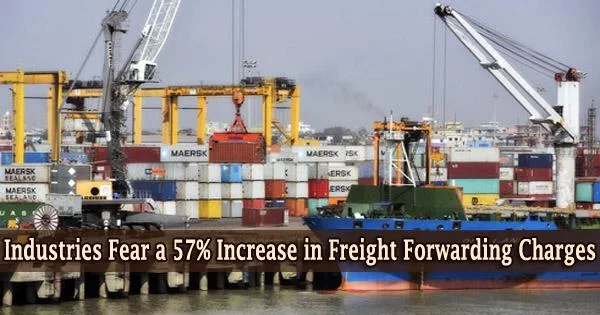According to traders, a staggering 57% increase in freight forwarding fees will put an additional Tk546 crore burden on the nation’s importers each year.
Local consumers will actually pay the majority of the increased price, but exporters worry that they will lose their competitive edge because it will be difficult for them to pass on the increased price to foreign customers given the trend in export demand that is slowing down, according to businesspeople.
The Bangladesh Freight Forwarders Association (BAFFA) hiked forwarding charges by Tk2,000 to Tk5,500 for each import bill effective from 1 September 2022 citing the recent increase in fuel prices.
The freight forwarders’ group defended the price hike by claiming that the Destination Service Charge had not risen since 2014.
According to the association, when utility and fuel costs rose over time, their cost of doing business increased as well. The most recent increase in fuel oil prices left them with little choice but to raise the fee.
The unexpected decision deals a further blow to sectors like the ready-made garment (RMG) industry that export finished goods after importing raw materials, placing them at risk of losing market share due to an increase in production costs, they noted.
The Bangladesh Garment Manufacturers and Exporters Association (BGMEA) has demanded that the decision to increase forwarding charges be withdrawn. The trade body has already written to Chattogram Port, the National Board of Revenue, the Ministry of Shipping, the BAFFA president, and the Commissioner of the Chattogram customs house in this regard.
The BGMEA said the shipping ministry in 2010 last fixed the Destination Service Charge for each import bill, or bill of lading (BL), at Tk2,000.
We are lagging behind our competitors. Buyers have to spend $10,000 to $12,000 in freight charges to import one TEU of goods from Bangladesh. But the cost is in the range of between $5,000 and $6,000 when they import from our competing countries, including Cambodia and Vietnam.
Shamsul Azam
But freight-forwarders on its own raised the charge to Tk3,500 in 2013, the trade body said, accusing freight forwarders of overcharging the apparel exporters by Tk1,890 crore in the eight years since 2013.
And now a 57% increase in forwarding charges will result in an additional annual expenditure of approximately Tk546 crore for importers, the letter further says.
Mahbubul Alam, president of the Chattogram Chamber of Commerce and Industry, expressed his concerns over the increase in forwarding charges, saying this decision to increase the charges without having discussions with the stakeholders is unethical and will have an adverse impact on commodity prices, affecting consumers who are already reeling under the impact of the soaring cost of living.
Due to lower-than-normal export orders for clothing, traders in the ready-to-wear industry claim that freight forwarders have increased fees. They said that the Russia-Ukraine War, European and American inflation, and the garment industry all already unstable.
In this situation, rising freight forwarding costs have increased the pressure on this industry. As a result, sustaining the business has become difficult.
Shamsul Azam, director of the Bangladesh Knitwear Manufacturers and Exporters Association (BKMEA) told The Business Standard that the cost of production has further increased in the wake of the increase in freight forwarding charges.
“We are lagging behind our competitors. Buyers have to spend $10,000 to $12,000 in freight charges to import one TEU of goods from Bangladesh. But the cost is in the range of between $5,000 and $6,000 when they import from our competing countries, including Cambodia and Vietnam.”
He noted, “We are already lagging behind our competitors due to the increase in freight charges, ICD charges, and other business expenses. Now the hike in forwarding charges has made us very concerned.”
Syed Nazrul Islam, first vice president of the BGMEA, told TBS that the demand for clothing in the international market is decreasing day by day amid the global economic downturn, as a result of which international buyers are also every now and then suspending import orders to Bangladeshi suppliers.
“In such a situation, the increase in freight forwarding charges will cause Bangladesh to lose its competitive edge in the global apparel market, leaving an adverse impact on the national economy,” he said.
Md Faizur Rahman, commissioner of Chattogram customs house, said the matter of hiking or reducing freight forwarding charges does not fall under the jurisdiction of the customs department.
Earlier, the Bangladesh Inland Container Depots Association (BICDA) hiked container handling charges following the recent hike in fuel oil prices.
The association raised the fees for handling imported goods by 35%, empty containers by 24%, and export goods by 25% following the increase in oil prices on August 6, 2022.
Later, when diesel price was slashed by Tk5 a liter, the handling charge for export products was reduced from 25% to 21.5%, the handling charge for import products was slashed to 30%, and empty containers to 20.5%.
















